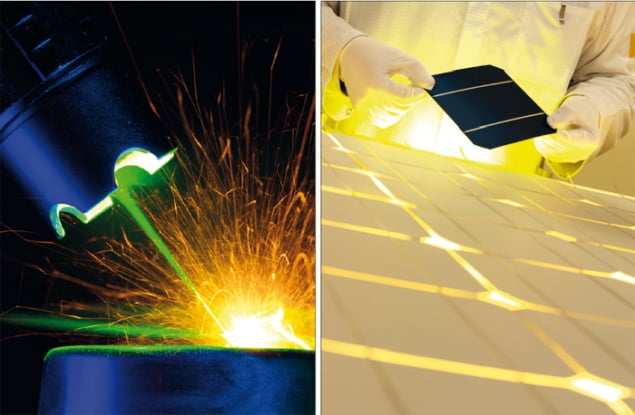In this new series of columns, James McKenzie aims to raise the profile of industrial physics and explore the value and relevance of physicists to industry

I have spent much of my career in industry using my physics education to solve problems. The nature of these problems has varied considerably over the years, from my industrially sponsored PhD in 1990 to running university spin-out businesses to founding my own company, PhotonStar LED Group, in 2007. Throughout this period, however, my favourite problems have been those that were both technical and commercial: I really like taking technology and using it to make things, and specifically products. I have done this with varying degrees of success over the years, and I hope to share some of these experiences as this column develops, with a view to tackling some of the age-old problems physicists face as they progress in their careers in industry.
Platform for success
One strong – and perhaps rather biased – opinion I hold is that a good physics background is a great place to start for nearly any career. Please don’t get me wrong: there are many pieces to the puzzle, and all of them are important. In particular, engineering and physics have similar skill sets, and I am proud to be a chartered engineer as well as a chartered physicist. Both of these accolades – which I gained through the Institute of Physics (IOP), which publishes Physics World – have been extremely helpful to me in my career, and I would urge anyone to consider applying for chartership.
Yet it seems to me that a deeper understanding of the underlying principles, as gained through a physics training, often enables people to come up with more radical solutions to problems – to “think outside the box” in some ways. Of course, I could also cite examples in my career where a deep understanding has actually been a distraction, and the solution came from simply getting on with the problem inside the box. But then, this is Physics World and I am among like-minded individuals, so perhaps we can leave that statement there without further proof or explanation.
Although I joined the IOP as a student and have been an avid reader of Physics World ever since, my career in industry has been quite specialist in some ways – and, as a result, I’ve been rather blinkered to all the amazing things going on in the wider physics community. This is something I have enjoyed remedying since autumn 2016, when I was elected to a four-year term as the IOP’s vice-president for business. This role has allowed me to see many similar themes and issues emerging in physics-based businesses. A particular highlight has been the chance to sit on the judging panel for the IOP Business Innovation Awards, where I get to see some fantastic innovations and meet entrepreneurs who are using physics to solve problems in many different fields. The number and quality of entries to these awards has risen year on year. Last year’s impressive set of winners demonstrated the impact of successfully applying physics in a wide range of sectors, including healthcare, space, quantum computing, communication and defence.
Until I took up this role, I didn’t realize just how important physics-based sectors are to the economy. All told, these sectors – which include manufacturing, energy production, the automotive industry and many others – contribute more than £177bn and €23bn to the UK and Irish economies, respectively, each year, while employing 6.7% of the workforce in the UK and 8.6% in Ireland. The IOP itself reflects this strength, with many IOP members working in business or industry, and (as I have discovered) the organization does a lot to support them.
Nevertheless, some physicists, especially those in industry, have at times perceived the IOP as being too academically focused. While I now disagree, it is certainly true that the IOP could always do more. (I should at this point be clear in that the views expressed in this column are my own and do not represent IOP policy.) This is one reason why we have recently set up a new IOP group dedicated to business, innovation and growth. This group – which had its formal launch in October 2017 during the Business Innovation Awards reception in the Houses of Parliament – will sit alongside the IOP’s existing groups (for women in physics, medical physics, energy and more than 40 other areas) and will, I hope, complement them. Its goal is to provide an opportunity for like-minded individuals to meet, network, share experiences and discuss common issues faced.
Next steps
In future columns, I plan to address a few of these issues, including the challenges and options available for funding physics-based businesses; the links between academia and industry; university spin-outs; the value of intellectual property; and examples of what can go wrong (and right!) during commercialization.



